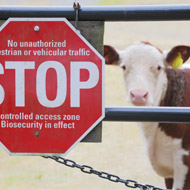
Report recognises value of all members of the profession
BVA president Simon Doherty has welcomed the latest report by the UK Surveillance Forum (UKSF) on the UK approach to animal welfare.
The UK approach to animal health surveillance report provides an outline of the requirements needed for the surveillance of threats to both animal and public health.
Reviewed annually by the UKSF - comprised of the chief veterinary officers, their deputies and key policy officials - the report sets out the principles by which animal health surveillance will be delivered in the UK.
Mr Doherty said: “It is essential that the UK Governments, the veterinary profession and other key stakeholders work collaboratively to enhance the UK’s disease surveillance networks. BVA set out our comprehensive position on veterinary scanning surveillance in May last year and we are delighted to see many of our recommendations echoed in this latest report.
“We are particularly pleased that the report clearly recognises the value that all members of the veterinary profession add by contributing to animal health and disease monitoring in all its forms, be that production animal, equine, wildlife or companion animal.
He continues: “Our position statement also set out the crucial importance of improving communication, engagement, awareness and data-sharing to ensure we are using all the available data and evidence to protect both large and small animals in the UK from new, emerging and endemic disease. It is great to see a similar approach emphasised in the UKSF report and we look forward to further engagement with all of the chief veterinary officers on this issue.”



 The veterinary mental health charity Vetlife is inviting the veterinary community to join it for a sponsored cold-water dip.
The veterinary mental health charity Vetlife is inviting the veterinary community to join it for a sponsored cold-water dip.